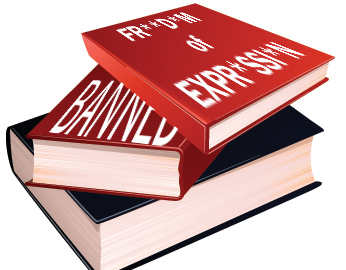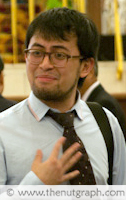IT’S been almost a year since Federal Territory Islamic Religious Department (Jawi) officers raided the Borders bookstore at The Gardens, Mid Valley on 23 May 2012. Accompanied by the media, officers seized copies of Irshad Manji’s Allah, Liberty and Love and its Malay translation. The bookstore’s Muslim and non-Muslim employees were questioned and some were required to go to the Jawi office for further examination, including a non-Muslim general manager. The outlet’s store manager, Nik Raina Nik Abdul Aziz, a Muslim, was later charged in the Syariah Court under Section 13 of the Syariah Criminal Offences (Federal Territories) Act for selling a publication deemed contrary to Islamic law.
Borders then sought a judicial review of Jawi’s actions, and recently, the High Court on 22 Mar 2013 held that Jawi had acted illegally. What are the implications of this decision for Malaysians, both Muslims and non-Muslims?

Hands off non-Muslims
The High Court has made it crystal clear that Islamic authorities have no power to act against non-Muslims. Jawi’s raid was under the Syariah Criminal Offences Act, which judge Datuk Zaleha Yusof said clearly applies only to Muslims. She also agreed with Borders’ counsel that a company, being a creature of statute, does not profess any religion, and the Act also cannot apply to it.
“Since the Syariah law is only applicable to Muslims therefore the actions taken by [Jawi] against [Borders] and [the non-Muslim general manager] in my opinion were clearly illegal,” the judge had said.
The rule of law
Even if Jawi acts against Muslims, its actions must be in accordance with the law.
The Constitution gives the state legislature certain powers to create and punish offences by persons professing Islam. However, the court noted, the state cannot enact laws which are under federal jurisdiction, as stated in the Federal List. Item 21 on this list states “…publications, publishers, printing and printing presses” as being under federal jurisdiction.
This makes the validity of Section 13 of the Syariah Criminal Offences Act questionable as the offence it cites — of printing, publishing or disseminating any book contrary to Islamic law — comes under the Federal List.
But even if Section 13 were valid, the High Court judge added, the public first had to be informed about the publication that was contrary to Islamic law. She agreed with Borders’ counsel that to hold otherwise would mean that any Muslim employee working in a bookstore selling Christian Bibles or books on Hinduism or Buddhism could potentially be committing an offence.
No retrospective punishment
The judge also held that Section 13 of the Act had to be read in conjunction with federal law, and books had to be banned by the Home Ministry before they could be deemed contrary to Islamic Law.

Hishammuddin
This contradicted Home Minister Datuk Seri Hishammuddin Hussein who had stated in an affidavit that Jawi could seize books even before the Home Ministry had banned them.
The judge quoted Article 7 of the Federal Constitution: “No person shall be punished for an act…which was not punishable by law when [the act] was done… .”
As there was no prohibition order against the book when Jawi raided Borders, the criminal charge against Nik Raina was held to be contravening Article 7, as the dissemination of Manji’s book could not have been an offence at the time.
Freedom of expression

Jawi’s actions also infringe the freedom of expression, guaranteed by Article 10 of the Federal Constitution. This point was raised by Manji’s publisher, ZI Publications, in its judicial review application over a similar seizure of books by the Selangor Islamic Affairs Department (Jais), which is still pending.

Ezra Zaid
Freedom of expression is a fundamental requirement of any genuine democracy. It is vital for keeping state power in check and ensuring other human rights are respected. A state should therefore be very slow to curb freedom of expression. Restrictions are allowed when faced with clear threats to national security, public order or morality; or to prevent incitement of an offence — such as people encouraging others to commit violence. It is still unclear how Manji’s book, whose subtitle reads “The courage to reconcile faith and freedom”, poses this kind of threat. This is especially so as according to ZI Publications director Ezra Zaid, the English version was available since June 2011. This means the book was available for 11 months with no apparent threat to security or public order before Jawi descended on Borders in May 2012.

Jamil Khir Baharom (jawi.gov.my)
Minister in the Prime Minister’s Department Datuk Seri Jamil Khir Baharom said the book had elements that insulted Islam and that Manji’s ideology could have “negative implications on Muslims in Malaysia”.
It’s an unfounded statement, but even if it were so, it is no automatic justification to ban her book, or to deny her an audience in Malaysia. As US Supreme Court Justice Oliver Wendell Holmes once said, “…the best test of truth is the power of the thought to get itself accepted in the competition of the market.” If Manji’s book is indeed as offensive as Jamil claims, it is better to let it be read, ridiculed and reviled; rather than seized and banned, which only makes it more tantalising to the curious bystander.
What now?
We can only hope that our next government, be it Barisan Nasional or Pakatan Rakyat, will have increased respect for the rule of law and the Federal Constitution. It is up to us to be aware of how our laws work and of our fundamental rights to keep the government in check. Imagine if Borders had chosen to keep quiet. It was only through the company’s defence of itself and its staff that led to the High Court judgment declaring Jawi’s actions as illegal.
Ding Jo-Ann is looking forward to finally being able to vote in the 13th General Election. NutGraph



No comments:
Post a Comment
Note: Only a member of this blog may post a comment.